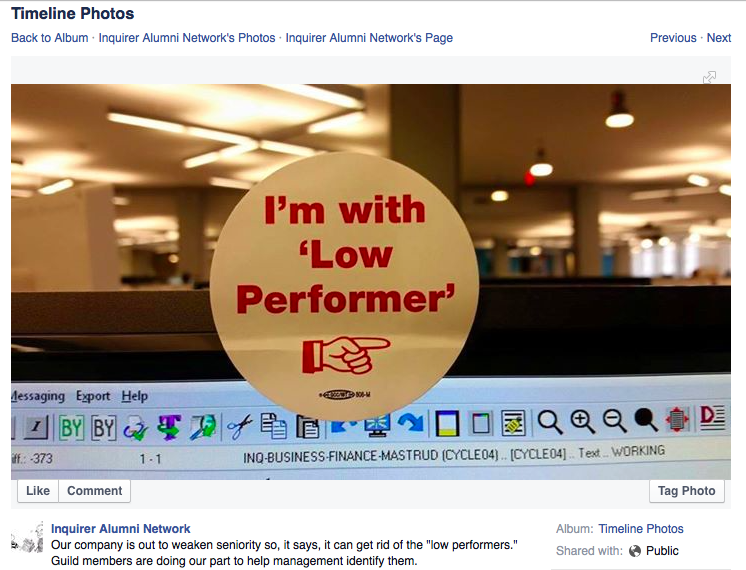Here’s What’s at Stake in Newspaper-Union Battle Over Seniority

The Newspaper Guild’s stance on the seniority question can be found on sarcastic stickers in PMN’s Market Street newsrooms — and on the web.
Who gets to be part of the future of Philadelphia’s biggest, most venerable journalistic enterprise? Young, eager newbies ready to stake their claim to the city? Or older workers who’ve already spent 20, 30 years or more adapting to sweeping changes they never could’ve anticipated at the beginning of their career?
That’s one of the big questions at the heart of the dispute between Philadelphia Media Network — owner of the Inquirer, Daily News, and Philly.com — and the Newspaper Guild that represents the company’s journalists, ad sales staff and other support staffers. Most of the focus on the jammed-up negotiations between the two sides has been about the medical benefits those staffers will receive, but another question — seniority — looms just as large.
The essential conflict is this: The union wants to keep long-held “last-hired first-fired” seniority rules in place, so that long-tenured (read: older, more expensive) journalists aren’t tossed overboard in favor of cheaper, younger labor should the company do layoffs again in the near future. The company, though, says it needs flexibility to keep the workers who contribute best to its vision of 21st century journalism (read: younger, more tech-savvy) — and to more easily shed workers who don’t.
Thus, the impasse.
“Seniority is a core principal of our union,” said Bill Ross, executive director of the Newspaper Guild of Greater Philadelphia. “The company’s attempt to weaken it, or eliminate it, will not generate one dollar in revenue for the employer.”
“Our seniority language proposals have not been aimed at negating the value of length of service as a critical factor. That point has been grossly misrepresented,” said Stan Wischnowski, PMN’s vice president of news operations. “We’re simply saying that in 2015 and beyond we need the ability to go beyond length of service as the sole factor, and we’ve seen this recognized by union and management negotiators at places like the Washington Post, San Francisco Chronicle, Boston Globe, Milwaukee Journal-Sentinel and several other major news organizations.”
Neither side would describe on-the-record their precise position on the seniority issue. But sources familiar with the PMN’s proposal said it was similar to one enshrined in a 2013 agreement between the Washington Post and its Guild employees. It’s a hybrid of flexibility and seniority — letting the company pick 25 percent of the employees it wants to keep in case of layoffs, with the remaining 75 percent shed according to the “last-hired, first-fired” rule.
“The Guild believes this is fair to people who have been loyal to the Post for much of their careers while granting the Post flexibility in the makeup of its staff – and also discouraging the Post from churning more experienced, more costly employees for less-experienced, lower-paid staff,” that paper’s Guild leaders said in a 2013 memo to members.
PMN did share with Philly Mag a list of similar compromises between other major newspapers. (See below.) Wischnowski says the company needs to have the option of having the right workforce carry the company into the future.
“If we get into the unfortunate position of needing to reduce staff because of market forces, we need to make decisions based on a combination of factors, including specialized skills, merit, experience, performance and length of service to ensure we have the best workforce to compete in the print and digital arena,” he said. “This news company is not unique in that pursuit.”
In a May memo to employees, though, Wischnowski used blunter language to describe the company’s goals. “A system that only serves to protect low performers is unfair to the individuals who strive to help our organization succeed into the future,” he wrote.
That provoked a stern reaction from the Guild, who called the comment “insulting.” In the newsroom, stickers bearing the logo, “I’m with low performer” have popped up on desks and computer monitors.
That gets to the heart of the question about seniority, though. Does it protect old writers who have long since left their peak productivity behind? Or does it offer cover to experienced, productive journalists who happened to get more expensive — and thus under more scrutiny at budget time — by virtue of sticking around for a while.
Or both?
It’s not hard to find the occasional staffer at PMN who will sigh about an older, seemingly unproductive worker — though never for public consumption. It’s far easier to find somebody like Ellen Gray, the Daily News TV critic, who says: “I don’t know who these ‘low-performers’ are they’re talking about. I don’t work with them.”
The Guild has already voted to begin strike preparations; the current contract between the two sides expires June 27th.
Follow @JoelMMathis on Twitter.


